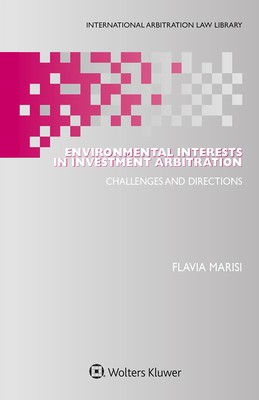
- Išsiųsime per 10–14 d.d.
- Autorius: Flavia Marisi
- Leidėjas: Kluwer Law International
- Metai: 2020
- Puslapiai: 408
- ISBN-10: 9403517239
- ISBN-13: 9789403517230
- Formatas: 15.6 x 23.4 x 2.4 cm, kieti viršeliai
- Kalba: Anglų
- Extra -15 % nuolaida šiai knygai su kodu: ENG15
Atsiliepimai
Aprašymas
Environmental Interests in Investment Arbitration
Challenges and Directions
Flavia Marisi
Economic growth, social inclusion, and environmental protection stand at the core of sustainable development, which aims to deliver long-term growth for current and future generations. Foreign Direct Investment (FDI) can play a key role in sustainable development. Host states' benefits descending from FDI inflows include tax revenues, technology transfer, specialised training of local human resources, network with satellite activities, better availability of quality products and customer-centric services. These downstream effects jointly stimulate economic growth and social inclusion. This thoroughly researched book explores the relationship between environmental protection - the third component of sustainable development - and FDI.
In practice, the intersection between environmental protection and foreign investment not only has generated remarkable success stories such as cross-sectoral green investment but has also in some instances led to severe cases of environmental degradation. Certain foreign investments resulted in open-pit mines leaking harmful substances into the soil, excessive deforestation, improper treatment of water, pollution of groundwater and contamination of mud pits following oil exploitation, leaving the host state with significant environmental damage. Some other cases have witnessed the host state withdrawing or infringing its own environmental policies, which could, in principle, lead to a decrease in the value of the foreign investment as a result of natural resources deterioration.
In recent years, an increasing number of investment arbitration cases have seen a clash between the states' commitments towards their citizens, which include the duty to protect the environment, their health and well-being, and the commitment towards foreign investors to protect their investments. In this book, the author focuses on investor-state cases in which environmental protection measures have been contested and discusses substantive mechanisms in treaty drafting, rules of Customary International Law, and interpretation doctrines, which are aimed at taking environmental concerns into consideration.
The topics covered include the following:
- statistical analysis of investor-state cases where environmental protection measures have been contested;
- the role of environmental principles in investor-state arbitration;
- treaty mechanisms addressing environmental concerns;
- legal tools available under Customary International Law to address environmental interests;
- the application of the doctrines of proportionality, police powers, and margin of appreciation; and
- environmental counterclaims as an instrument to claim compensation for environmental damage.
The author provides a detailed framework on the normative architecture, offers an extensive analysis of the relevant case law, and proposes concrete solutions to the identified clashes, aimed at refining the balance between environmental and investment protection.
With its in-depth analysis and careful documentation, this book aptly captures the inherent fragmentation of international law and undoubtedly represents an invaluable resource for both international law practitioners and scholars. The solution-oriented approach adopted in the book will be welcomed by legal counsel, law firms, investment treaty negotiators, and decision makers at the different stages of investment lawmaking and practice, as well as by international institutions and academics.
EXTRA 15 % nuolaida
Kupono kodas: ENG15
Akcija baigiasi už 06:33:04
Nuolaidos kodas galioja perkant nuo 10 €. Nuolaidos nesumuojamos.

- Autorius: Flavia Marisi
- Leidėjas: Kluwer Law International
- Metai: 2020
- Puslapiai: 408
- ISBN-10: 9403517239
- ISBN-13: 9789403517230
- Formatas: 15.6 x 23.4 x 2.4 cm, kieti viršeliai
- Kalba: Anglų
Environmental Interests in Investment Arbitration
Challenges and Directions
Flavia Marisi
Economic growth, social inclusion, and environmental protection stand at the core of sustainable development, which aims to deliver long-term growth for current and future generations. Foreign Direct Investment (FDI) can play a key role in sustainable development. Host states' benefits descending from FDI inflows include tax revenues, technology transfer, specialised training of local human resources, network with satellite activities, better availability of quality products and customer-centric services. These downstream effects jointly stimulate economic growth and social inclusion. This thoroughly researched book explores the relationship between environmental protection - the third component of sustainable development - and FDI.
In practice, the intersection between environmental protection and foreign investment not only has generated remarkable success stories such as cross-sectoral green investment but has also in some instances led to severe cases of environmental degradation. Certain foreign investments resulted in open-pit mines leaking harmful substances into the soil, excessive deforestation, improper treatment of water, pollution of groundwater and contamination of mud pits following oil exploitation, leaving the host state with significant environmental damage. Some other cases have witnessed the host state withdrawing or infringing its own environmental policies, which could, in principle, lead to a decrease in the value of the foreign investment as a result of natural resources deterioration.
In recent years, an increasing number of investment arbitration cases have seen a clash between the states' commitments towards their citizens, which include the duty to protect the environment, their health and well-being, and the commitment towards foreign investors to protect their investments. In this book, the author focuses on investor-state cases in which environmental protection measures have been contested and discusses substantive mechanisms in treaty drafting, rules of Customary International Law, and interpretation doctrines, which are aimed at taking environmental concerns into consideration.
The topics covered include the following:
- statistical analysis of investor-state cases where environmental protection measures have been contested;
- the role of environmental principles in investor-state arbitration;
- treaty mechanisms addressing environmental concerns;
- legal tools available under Customary International Law to address environmental interests;
- the application of the doctrines of proportionality, police powers, and margin of appreciation; and
- environmental counterclaims as an instrument to claim compensation for environmental damage.
The author provides a detailed framework on the normative architecture, offers an extensive analysis of the relevant case law, and proposes concrete solutions to the identified clashes, aimed at refining the balance between environmental and investment protection.
With its in-depth analysis and careful documentation, this book aptly captures the inherent fragmentation of international law and undoubtedly represents an invaluable resource for both international law practitioners and scholars. The solution-oriented approach adopted in the book will be welcomed by legal counsel, law firms, investment treaty negotiators, and decision makers at the different stages of investment lawmaking and practice, as well as by international institutions and academics.





Atsiliepimai